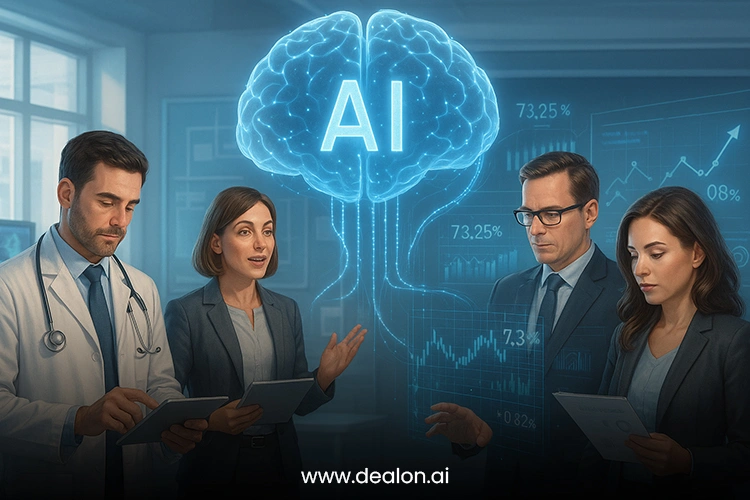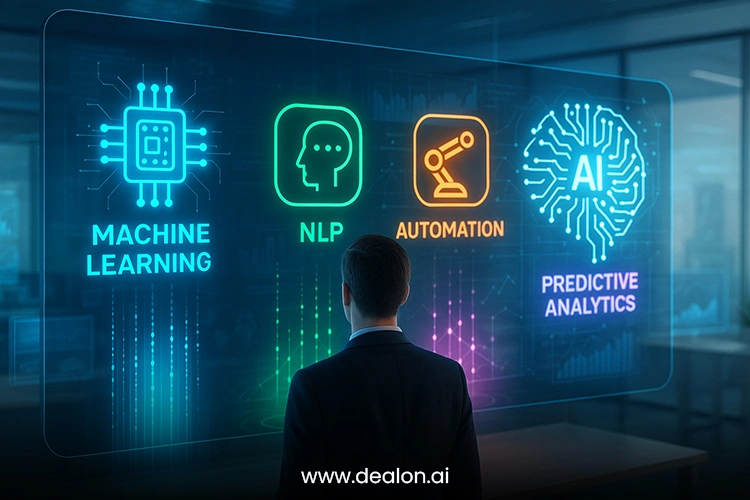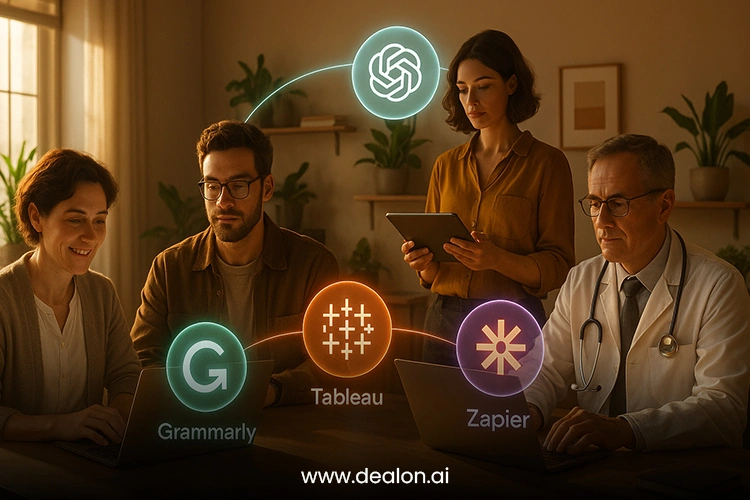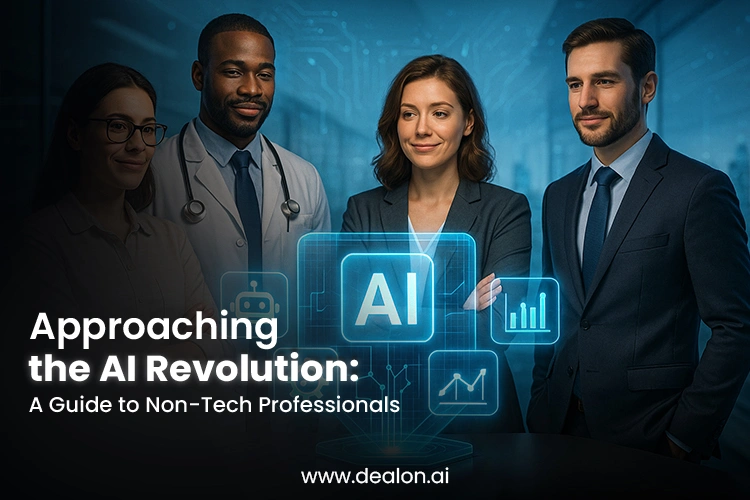With the increase in AI, people believe only the tech field will be affected. Such an assumption is incorrect. AI is set to make an impact in every workplace. People in the finance, healthcare, marketing, and education industries will be welcoming various AI tools. Non-tech professionals have to reskill in AI as it is the only way they will be able to compete in the growing digital industry.
Some people believe AI is too complicated, but in reality, basic AI tools are easy to master. Learning the tools does not require one to understand ML or neural networks. Non-technical professionals can access AI tools, learn the foundational basics, and understand how to implement them in their industry. AI will simplify complex tasks, increase productivity, and simplify data-driven decisions.
This guide seeks to provide you with knowledge applicable to implementing AI in your profession. Suppose you’re a marketer managing campaign performance with AI marketing analytics or a project manager to simplify your workflow through the automation of mundane administrative activities. In that case, this post will provide the requisite knowledge and tools applicable to the integration of AI in your work non-technical work activities. We will analyze several easy-to-use, yet effective, AI technologies, distill essential concepts, and provide stepwise approaches to the seamless integration of AI into the workflow.
There is no doubt that the future is AI. And those non-tech professionals who adopt this change will have tremendous advantages in their roles. By acquiring new skills in AI, you will not only be preserving your profession for the foreseeable future. Still, you will also uncover distinctive new avenues of work and integrate yourself into the rapidly changing economy dominated by AI. Let us embark on the journey of AI mastery, no coding needed.
Also Read: The Challenge of Complex Thinking: Is AI on the Path to True Reasoning?
Recognizing the Need for AI for Professionals Outside of The Technology Sectors

We are now in an era where the digitization of a business is deemed a necessity and not a luxury feature reserved for the behemoths of the industry and software development companies. The scope of Artificial Intelligence(AI) is growing with the growing age of innovation. No matter if a person is a finance specialist, a doctor, a teacher, or an artist, there is an impact of AI in every field of work. The existence of Artificial Intelligence is not so much confined to the work of a techno whizz, but equally, an AI is relevant for a professional who is concerned with skill acquisition, operational efficiency, and optimizing the workflow of the business.
One of the primary reasons why AI is a necessity for a professional outside the technology domain is due to the ability of AI to perform monotonous tasks and decision-making in complex scenarios. As an example, marketers who are provided AI software do a much better job with audience segmentation, consumer behavior prediction, and personalized campaign generation.
AI software is equally helping finance professionals with risk assessments, fraud detection, and portfolio management. For healthcare, AI is helping them with diagnostic and treatment plan formulation, and predictive health management on a timely basis. All these reasons are sufficient to say that AI is now a mandatory component of business processes, irrespective of the field of work.
It is not necessary for non-tech professionals trying to embrace AI to understand coding or machine learning at a complex level. AI adoption hinges on recognizing scenarios where the technology could make a difference. They should focus on understanding the frameworks that allow for the use of AI to reduce complex processes to simple, resource-productive, evidence-based, and automated workflows. In doing so, they will reduce the effort dedicated to repetitive tasks and use that time to perform more valuable work, which enhances their productivity and improves their career trajectory.
On a practical level, the use of AI gives these professionals access to information that they may not have been able to access in the absence of AI. AI provides the frameworks that allow professionals the ability to analyze large data sets and use predictive analytics to help form better decisions. This enables them to stay competitive in the workplace and, at the same time, enables them to be viewed as innovative and flexible at a time when there is increased demand for AI-savvy professionals.
Key AI Concepts Non-Tech Professionals Should Familiarize Themselves With

For non-tech professionals to start, they need to understand the basics behind AI and how it works. Familiarity with specific terminology will help understand the core concepts and how best to apply them in the scope of work each individual has. They must know the following terms in AI to be relevant in their work. Machine Learning (ML): Machine learning is an aspect of AI that permits systems to learn from given data and increase accuracy over time, without being explicitly designed to do so.
It is the engine behind recommendation systems, fraud detection systems, and specific predictive analytics platforms. Machine learning is an astounding technology; however, for non-tech professionals, it is essential to understand that it enables the application of AI in customer segmentation, sales prediction, and inventory management. Once machine learning is understood on a certain level, professionals can efficiently employ AI tools in their work for more productive outcomes.
Natural Language Processing (NLP): NLP is an area within AI that seeks to allow machines to comprehend, analyze, and even produce human language. In the case of professionals dealing with customer support, marketing, and even content generation, NLP can be incorporated to automate customer conversations, feedback analysis, and even content generation. Understanding the principles of NLP can provide an individual with the necessary skills to improve their business communication and provide better customer service.
Automation: Automation is the use of AI to perform repetitive and time-consuming tasks without the need for human assistance, which is also known as AI-driven automation. These tasks range from data entry, email filtering, scheduling, and some fundamental customer service tasks. To non-tech professions, tools designed for automation, such as Zapier or UiPath, help save time from mundane tasks, which can then be used for more productive and creative activities. Automations help improve operational effectiveness and also reduce human error.
Predictive Analytics: Predictive analytics applies artificial intelligence to examine and collect data and extrapolate future events or behavior. Machine learning models enable a business to project future sales, gauge customer actions, and track market trends. Non-technical users, more specifically in marketing, finance, and operations, greatly benefit from predictive analytics solutions, which provide insights that enable users to take proactive actions. Predictive analytics is a sophisticated technique that, when harvested, can increase the efficacy of business forecasts and sharpen the overall strategy.
These concepts mark the easier, more accessible side of AI and the first step in integrating these concepts into one’s arsenal. Shifting focus from learning complex concepts and instead seeking denotative meanings and use cases will assist many non-technical professionals to excel in integrating AI learning into their tasks. The future does not only belong to the technology-savvy. It belongs to everyone with the willingness to adapt, learn, and make use of the overwhelmingly powerful capabilities of AI. Automating tasks, data analysis, and mid-level task communication solutions are just a part of non-technical professionals’ use cases, and there is a paradigm shift with AI.
Needed AI Instruments for non-technical professionals

As AI continues to develop and progresses toward an integral part of every business, non-technical professionals need to learn how to make use of the technology to stay relevant. The good news is that there is enough literature available that elaborates step-by-step procedures for leveraging AI. Successful completion of these tasks will give every non-technical professional a tailored roadmap to make use of AI in their work routine successfully. There is a standard set of capabilities an AI tool set should have; AI tools should enhance professional productivity, work, and decision making across a diverse (cross-domain) industry set, and there should be no prerequisite for programming and data science.
An application of AI technology that is accessible to individuals in professions outside of information technology is the use of AI-driven chatbots. Businesses that use platforms like Drift and Intercom can provide round-the-clock assistance and support to their clients with little to no human intervention. These platforms can utilize artificial intelligence to capture and convert leads, provide instant answers to customers, and assist users in finding the correct web pages.
They can also converse with clients and customers instantaneously, which in turn enhances the customer experience. This is accomplished while also lowering the company’s expenses. Integration of AI chatbots in an organization’s workflows and daily tasks can increase the productivity and efficiency of individuals in customer support, sales, and marketing through tailored interactions. This is accomplished with minimal effort on the employee’s part.
Grammarly and Jasper AI are excellent examples of AI used in the enhancement of written communication. These applications serve more than the purpose of only checking grammar; they assist in optimizing content for readability, tone, Search Engine Optimization (SEO), and the overall impact of content. For marketers, bloggers, and professionals in almost any industry that require content creation regularly, AI tools such as the ones described above enable them to produce content faster without compromising the quality of the produced content.
For example, Jasper AI assists in the creation of engaging social media posts and the generation of blog ideas based on frequently searched keywords, thereby improving workflow in the content creation process. Such AI tools must be used often in the day-to-day activities for the non-technical professionals to remain competitive in the modern marketing arena, which is highly content-driven.
The analysis of data, which was in the past reserved for a few specialists, is now an area of activity that a growing number of non-tech employees engage in, thanks to Artificial Intelligence. Tools like Tableau and Google Analytics facilitate data comprehension and analysis without the user having to acquire advanced data science capabilities. This technological dynamism helps professionals to predict changes or shifts in strategies and make decisions that are backed by in-depth data analysis. These decision-making capabilities have become very important in the modern world, which is governed by data.
As for people who are not in the technology industry and are managing or supervising teams, tools such as Asana and Trello have proven AI functionalities that can help streamline productivity. These systems employ algorithms to predict delays, suggest optimal resource allocation to the workflows, and recommend ways to streamline processes. These systems can even monitor the status of workflows to expect delays and suggest modifications to meet the project deadline.
All of this would result in the project manager having to spend much less time tracking projects and more time managing potential roadblocks and communication failures. It is indeed an appropriate statement to make that the internet-based tools driven by AI help in tackling the processes, and at the same time, make reasonable predictions that improve the situational awareness of the planner. Such systems bring about unanticipated efficiencies that will enhance the project’s success rate.
Given the expanding use of artificial Intelligence tools by non-technology professionals for the augmentation of daily activities, the question of how these tools can be integrated into daily work routines becomes highly relevant. The good news is that one does not have to become a fully-fledged technology professional to learn how to use AI tools.
There are friendly, bite-sized, actionable steps that non-technology professionals can follow to build an understanding of AI, beginning with the most basic AI courses on platforms. The focus of these courses is on the pragmatic use of AI; purposefully left aside are the workings of code or how to build an algorithm, which is most suitable for a non-technology person.
Non-technology professionals can use AI tools with relative ease once introductory instructional courses are undertaken. Self-study, though practical, does not yield as good results as actively participating in webinars, workshops, or other AI-centered Learning gatherings. These professional gatherings are helpful not only to learn the most cutting-edge tools of the discipline, but also to understand how these tools are deployed in other areas of work.
Participants also have the chance to interact with professionals and colleagues facing the same challenges. These gatherings do a good job of improving understanding of the discipline zone of AI, in which people are working. AI technology can be adapted and modified to suit the practitioner’s needs.
In addition, actively employing AI tools in your day-to-day tasks is one of the quickest ways to learn. Every AI tool, be it chatbots, content generators, or analytics dashboards, has a free version or a trial period. Integrating these into your daily operations enables you to monitor the changes AI brings to productivity and decision-making. For instance, deploying AI software to streamline email filtering or scheduling meetings showcases the time and effort you save, empowering you to seek advanced features.
Reaching out to AI specialists or engaging with AI-centric communities are other techniques that can be of great help. These groups offer valuable understanding, assist with the initial steps of applying AI, and provide insights on emerging trends. Engaging with individuals who are already using AI will not only enable you to learn at a faster pace but also gain access to the current industry best practices.
The Future of AI and Its Impact on Non-Tech Professionals
The future of work will certainly involve artificial intelligence. More advanced versions of AI will eventually become critical to business operations, shaping the manner in which companies interact with customers, make decisions, manage resources, and even perform more creative tasks.
For non-tech professionals, the adoption of AI in business environments is more of an opportunity than a challenge, as it aids in the professional’s effort to improve in an epoch of the digitalized labor market. AI will not replace non-tech professionals, but instead will be given more complex tasks, as these professionals will be able to automate and streamline many routine tasks. Such a change will lead to a more strategic and practical output.
The influence of AI on non-tech professionals will be significant, with AI resources expected to become essential in a multitude of fields. In the field of Customer Service, for instance, the AI Chatbot and other virtual assistant resources are transforming the manner in which businesses engage with their customers. After the system has automated and resolved routine questions, it can provide customer service professionals with more complex queries, thus enhancing customer satisfaction.
In the field of Finance, AI tech and non-tech professionals who form the backbone of an organization will be able to make faster and more reliable decisions based on real data. This is made possible by AI’s unmatched ability to analyze, find patterns, and identify correlations within millions of datasets within seconds. In the field of Marketing, professionals will be able to work with advanced data-driven AI to analyze consumer behavior, thus enabling professionals to form more refined and targeted strategies.
AI is not only used to improve customer relations and streamline business operations, but it also allows non-technical individuals to undertake higher-value tasks. Non-technical professionals can improve productivity, minimize mistakes, and benefit from insights that are available only in real-time through the inclusion of AI technologies in their tasks. Adopting AI goes beyond knowing the relevant tools; it requires a change in attitude toward work and a proactive stance toward innovation. Non-technical professionals who keep pace with the changes that AI is bringing will be much sought after, with the knowledge and experience to thrive in a partnered, data-centered, and rapidly changing work environment.
Conclusion: Preparing for the AI-Powered Future
Advancements in AI can be detrimental to non-tech professionals unless they start seeing the technology as a complementary addition to their careers. The potential to adopt new skills and implement AI in their daily work would augment their skills and provide ample new opportunities. One can start their journey by grasping fundamental AI concepts and AI tools, and then proceeding to automation to change their workflows for the better in anticipation of the AI-powered future. While non-tech professionals may have to work the hardest, they stand to create new opportunities for themselves and provide meaningful leadership in their line of work.

